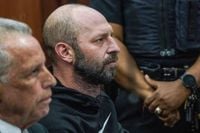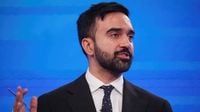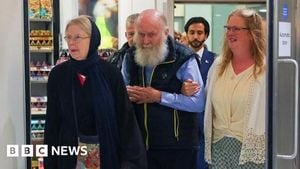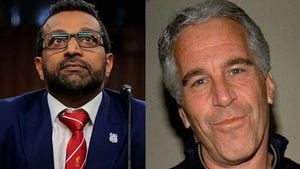On a sweltering Thursday in mid-September 2025, the political climate in New York City was rocked yet again—not by a heated debate or a close poll, but by the chilling details of a hate-fueled campaign of threats against the city’s leading mayoral candidate, Zohran Mamdani. The man at the center of this storm, Jeremy Fistel, a 44-year-old from Plano, Texas, now faces a 22-count indictment in Queens criminal court, including charges of terroristic threat and aggravated harassment, all classified as hate crimes. The story, reported widely by outlets including ABC News and The New York Times, has cast a harsh light on the fraught intersection of identity, politics, and public safety in the nation’s largest city.
According to Queens District Attorney Melinda Katz, Fistel’s threats were not just idle words. Over a seven-week stretch beginning in June, Fistel allegedly left a barrage of voicemails and written messages for Mamdani, each more disturbing than the last. In language laced with Islamophobia and racism, Fistel told Mamdani to “go back to Uganda before someone shoots you in the head,” warned him to “watch your back every second,” and declared that he and his family “deserve to die.” Some messages, as reported by The New York Times, went even further, wishing “terminal cancer” and a “painful death” upon Mamdani, and hoping that “an Israeli military bullet goes through your skull.”
Prosecutors say the threats were relentless, with messages arriving on June 11, June 18, July 8, and July 23, 2025. In one particularly sinister voicemail, Fistel allegedly warned Mamdani not to start his car, suggesting it would explode—a chilling allusion, according to The New York Times, to Israel’s detonation of Hezbollah operatives’ beepers in Lebanon the previous year. Another message told Mamdani to “check your beeper,” a reference that, to those familiar with Middle Eastern conflicts, was unmistakably menacing.
For Mamdani, a 33-year-old state assemblyman representing Queens and the Democratic frontrunner in the November 4 mayoral election, the threats were more than personal. They were emblematic of a broader, toxic climate. “We cannot and will not be intimidated by racism, Islamophobia, and hate,” his campaign declared in a statement. “Zohran remains steadfast in his conviction that New York must be a city where every single person—regardless of faith, background, or identity—is safe, protected, and at home.”
The NYPD, recognizing the gravity of the situation, assigned Mamdani a security detail as he pressed on with his campaign. The police investigation, led by the NYPD Hate Crimes Task Force and supported by the FBI and U.S. Marshals Service, culminated in Fistel’s arrest in Texas on September 11. He was extradited to Queens six days later and arraigned on September 18. Fistel pleaded not guilty. If convicted of the top charge, he faces up to 15 years in prison. His next court appearance is set for November 19.
Queens District Attorney Melinda Katz was unequivocal in her condemnation. “We take threats of violence against any office holder extremely seriously—there is no room for hate or bigotry in our political discourse,” she said in a statement on September 18, echoed again two days later. For Mamdani’s campaign, the DA’s response was a welcome show of resolve, but also a sobering reminder of the dangers that have become all too common in American politics. “Unfortunately, threats of this nature are all too common—and they reflect a broader climate of hate that has no place in our city,” a campaign spokesperson told ABC News.
The context for these threats is a city and a country on edge. The 2025 election season has been marked by a surge in political violence. Just last week, conservative activist Charlie Kirk was fatally shot in Utah, and in June, Minnesota Democratic state legislator Melissa Hortman and her husband were killed at home. Against this backdrop, Mamdani’s rapid ascent—from a political outsider to the Democratic nominee for mayor after defeating Andrew Cuomo in the primary—has made him both a symbol of change and a lightning rod for controversy.
Mamdani, who would be New York’s first Muslim and Indian American mayor if elected, has built his campaign around affordability issues, championing rent freezes, free public transit, and universal child care. His progressive platform has energized Gen Z and working-class voters, but it has also made him a target. Since clinching the Democratic nomination, Mamdani has faced a wave of racist and Islamophobic attacks, not just from anonymous callers but from prominent figures as well.
Donald Trump, for instance, has repeatedly questioned Mamdani’s citizenship and branded him a communist, even threatening to arrest and deport him. After New York Governor Kathy Hochul endorsed Mamdani, Trump suggested he would withhold federal funding from the state in retaliation, writing on Truth Social, “This is a rather shocking development, and a very bad one for New York City. How can such a thing happen? Washington will be watching this situation very closely. No reason to be sending good money after bad!”
Meanwhile, incumbent Mayor Eric Adams has not shied away from stoking the flames. In an interview with the New York Post published September 20, Adams described this electoral season as “mean and angry,” blaming what he called “radicalized” Gen Z voters for the city’s new climate of incivility. “A lot of young people are going on, doing great things, going to school—but a substantial pocket of our young people have been radicalized in the city through a number of means: our school campuses, through social media, through their peer groups. The radicalization is real,” Adams said. He has positioned himself as a middle-ground candidate, focusing on public safety and traditional values, while painting Mamdani as too radical for New York.
Adams’ own campaign has been dogged by scandal; he was indicted in 2024 for bribery and illegal foreign donations, but the case was dismissed with prejudice by the Trump-led Department of Justice earlier this year, sparking widespread concerns about political interference.
As for Fistel, the man accused of terrorizing Mamdani, court records reveal a complicated background. Raised in an Orthodox Jewish family in Massachusetts, Fistel attended private religious schools and later studied accounting at the University of Maryland. In 2012, he pleaded guilty to conspiracy to distribute marijuana and was sentenced in 2019 to time served with two years’ probation. Friends and family described him in letters to the court as a stabilizing presence, active in both Jewish and secular charities. Yet, as prosecutors allege, Fistel’s deeply held resentments found a new, dangerous outlet in the polarized world of 2025 American politics.
Despite the threats and the hostile environment, Mamdani insists he will not alter his grassroots approach to campaigning. In an interview with The New York Times, he affirmed his commitment to public engagement, refusing to retreat in the face of intimidation. For many in New York, his resolve is a testament to the city’s enduring belief in diversity, resilience, and the right to participate fully in civic life—no matter the obstacles thrown in the way.





